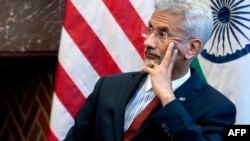Indian foreign minister Subrahmanyam Jaishankar is visiting Moscow for talks expected to focus on economic and political issues.
The two-day visit during which the Indian minister will meet his Russian counterpart Sergey Lavrov and Deputy Prime Minister and Minister of Trade and Industry, Denis Manturov, will be the first by a senior Indian official to Russia since Moscow's invasion of Ukraine in February.
Analysts say while most attention has been focused on the softer stance India has taken on Russia's invasion and its continued purchase of cheap Russian oil and coal despite Western sanctions, New Delhi has also been using its leverage based on longstanding ties with Moscow to underline the need to end hostilities.
Ahead of the visit that starts Monday, Indian foreign ministry spokesman Arindam Bagchi told reporters that India has always emphasized the need to return to diplomacy and dialogue to resolve the conflict. "I am sure that the external affairs minister would certainly be reiterating it," he said on Thursday.
The minister will be "looking at the economic elements" as well as exchange of views on "regional and international developments," Bagchi said.
India has not publicly called out Russia for the conflict and has abstained from United Nations resolutions critical of Moscow's aggression, but it has repeatedly said that it opposes the conflict and expressed concern about the violence.
"We believe that the conflict does not serve the interests of anybody, neither the participants nor indeed of the international community," foreign minister Jaishankar said at a press conference during a visit to Australia last month.
In September, Indian Prime Minister Narendra Modi told Russian President Vladimir Putin on the sidelines of a regional summit in Samarkand that "today's era is not an era of war, and I have spoken to you on the phone about this that democracy, diplomacy and dialogue are such things that touch the world."
Modi said that the world was grappling with major challenges, including food and energy crises that were hitting developing countries especially hard.
"India would be reiterating the need for some kind of a resolution, some kind of a political settlement during the visit because it cannot be an open-ended conflict," said Harsh Pant, head of the strategic studies program at the Observer Research Foundation in New Delhi. "Because India does not want to call Russia out publicly, private conversations will certainly allow [for] that to happen."
The war on Ukraine has posed a huge challenge for India in trying to balance its decades-long relations with Russia and its growing ties with the West. It does not want to antagonize either side — Russia is a huge arms supplier, while concerns about an aggressive China have prompted India to enhance strategic ties with the United States and embrace the Quad — a grouping of Japan, Australia U.S., and India.
But standing apart from its Quad partners, New Delhi has refused to support existing sanctions or impose their own on Moscow. It also has strongly defended its growing purchases of crude from Moscow at discounted prices — India has repeatedly said that it takes decisions based on its national interests and as a major oil and coal importer, its people need access to cheaper oil.
Russia became India's largest supplier of crude oil in October surpassing traditional suppliers, Saudi Arabia and Iraq, according to local reports.
However, as the war in Ukraine continues, the pressure on India to ensure that it does not alienate Western countries is growing.
"While New Delhi has been able to make its point to its Western partners for the moment, this window of opportunity will not be forever and there are worries that the longer the war drags out, the space for India in doing so will become narrower," Pant said.
But at the same time, New Delhi's good ties with Moscow also offer leverage, observers say. "There is a sense that India remains one of the few countries that enjoys some level of confidence of both sides, so there is a possibility that India can play a more proactive role than in the past in any potential efforts to resolve the conflict. All of these assumptions will be tested during this visit," he said.




